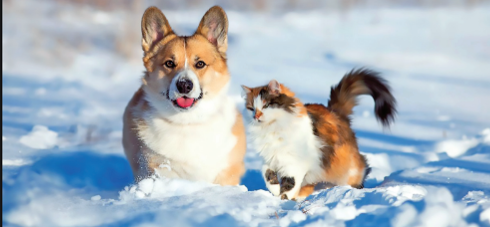Winter brings festive cheer, cozy nights, and chilly weather, but for pet owners, it also introduces unique challenges to keep our furry companions safe. Cold temperatures, snow, and holiday hazards can all impact your pet’s well-being. Here are a few simple steps you can take to ensure your pets stay healthy and comfortable throughout the season!
Bundle Them Up
While my husky loves winter and is well-equipped for the cold with a thick coat, others, especially short-haired breeds, may need extra protection. A sweater or coat can help keep your dog warm on walks, particularly those that cover the neck and belly. Just make sure the clothing fits well, allowing them to move easily without restricting their ability to breathe or walk.
Diet for the Season
Cold weather can influence your pet’s diet, especially if they are more active during the winter months. Pets that love playing in the snow or going on long walks might need more calories to fuel their energy. On the other hand, if your pet’s activity level drops during the winter, reducing their food intake slightly can prevent weight gain. Always consult your veterinarian before making any changes to their diet. Monitoring a monthly weight can help ensure our pets avoid accidental holiday weight gain!
Paw Patrol
Salt, snow, and ice can cause discomfort to your pet’s paws. Try to apply a pet-friendly ice melt in the highly utilized walkways around your house or place of business! After a walk, wipe their paws to remove salt and chemicals, which can irritate their skin. If your pet is sensitive to cold ground, consider using booties for extra protection or apply paw wax before heading outdoors.
Beware of Frostbite
Frostbite can affect areas like your pet’s ears, paws, and tail. Limit their exposure to freezing temperatures, especially if it’s windy. If your pet starts shivering, it’s time to head back indoors. Keep an eye on those sensitive spots, and always dry them off after being out in the snow.
Hydration Matters
Even in winter, pets can become dehydrated. Ensure they have access to plenty of fresh water, whether they’re indoors or outdoors. If your pet spends time outside, check that their water bowl doesn’t freeze.
Safe Shelter for Outdoor Pets
If your pet spends time outdoors, provide them with a well-insulated, dry, and wind-proof shelter. It should be large enough to let them move comfortably but small enough to trap heat. Make sure there’s plenty of bedding inside to keep them warm.
Holiday Hazards
With winter also comes the holidays, which means decorations, parties, and new potential risks for pets. Watch out for toxic plants like poinsettias and be mindful of holiday foods that are harmful to pets, such as chocolate, raisins, and onions. Keep your home pet-proofed as much as possible to avoid ingestion of any foreign holiday material!
If you have any questions about your pet’s health this winter, reach out to your veterinarian. At Berkeley Animal Hospital, we’re here to help your pets stay happy, healthy, and safe through every season!






